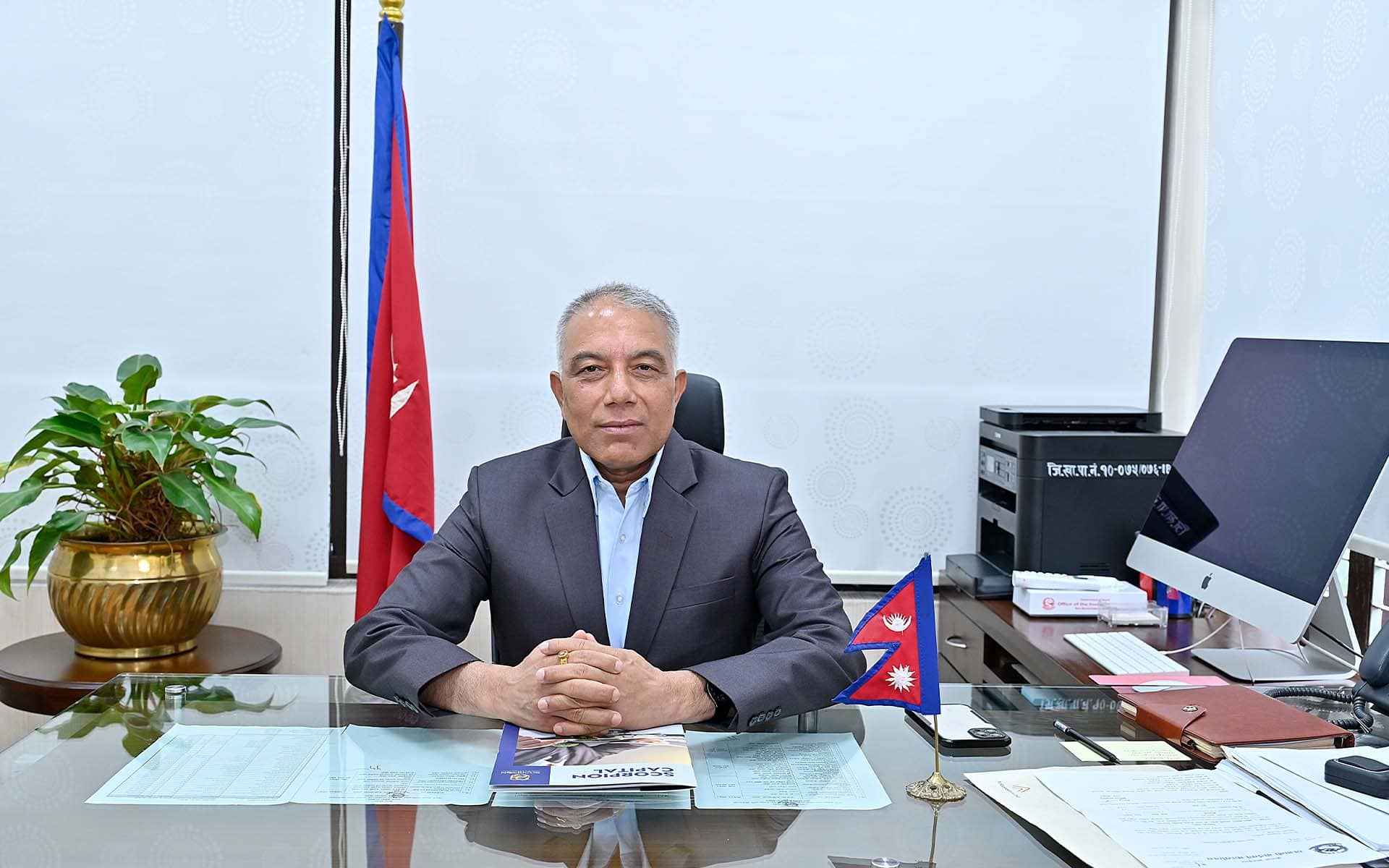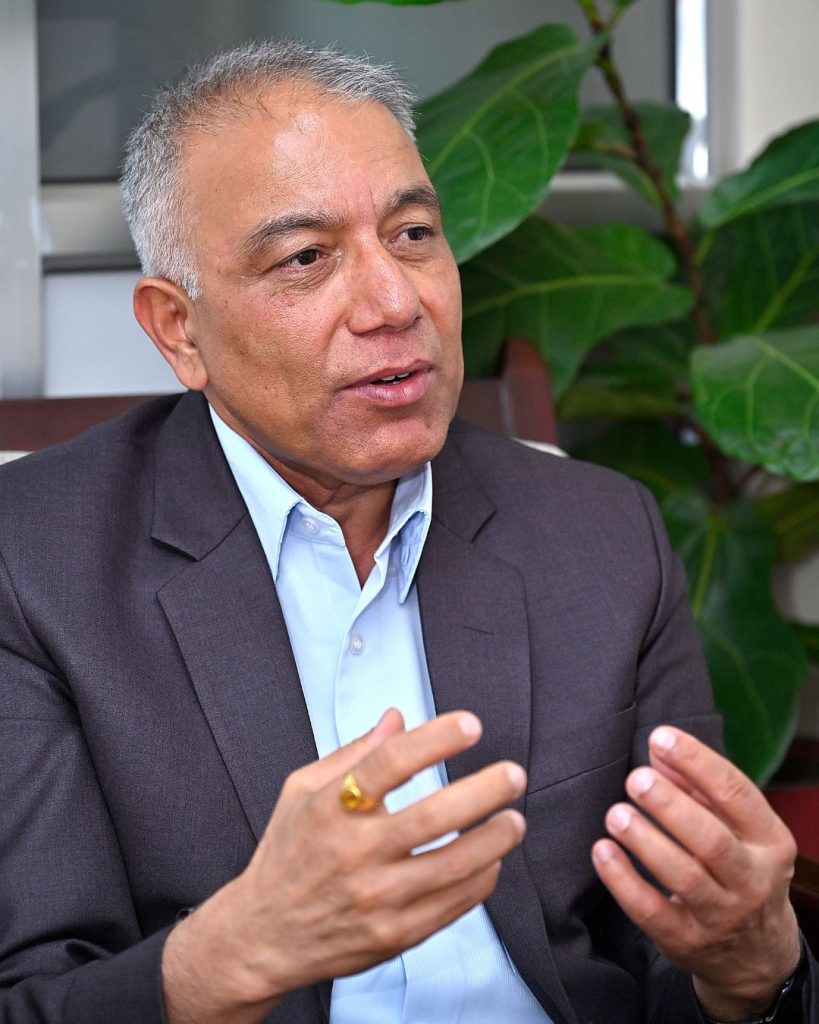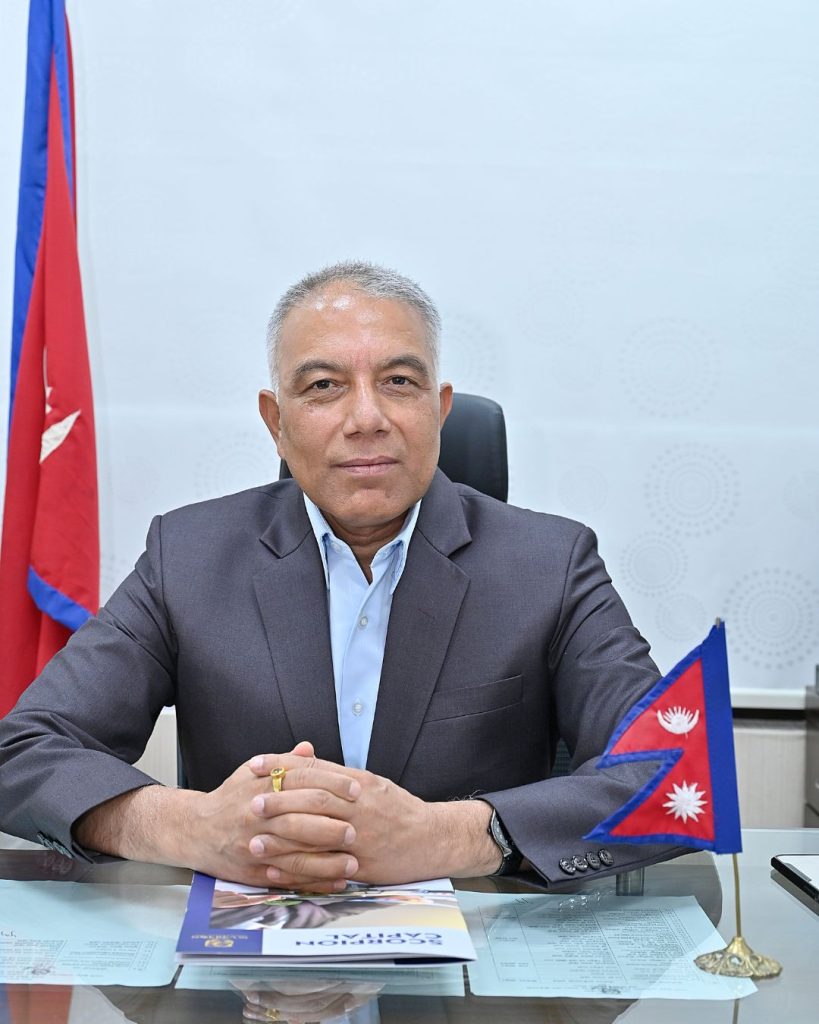
In September 2024, the Government of Nepal appointed Sushil Gyewali as the Chief Executive Officer (CEO) of the Investment Board Nepal (IBN). The IBN is tasked with a crucial responsibility of promoting economic development by creating an investor-friendly environment, and attracting both domestic and foreign investments.
As CEO, Gyewali currently holds the responsibility to run the institution to help achieve Nepal’s economic ambitions and long-term development goals. Prior to this role, Gyewali served as the CEO of the National Reconstruction Authority (NRA). Following the devastating earthquake of 2015, he led efforts to coordinate recovery at the NRA, overseeing large-scale reconstruction and rehabilitation initiatives across the country.
Before joining the NRA, he served as the Executive Director of the Town Development Fund (TDF) for nearly six years. He also served as Executive Secretary of the Municipal Association of Nepal (MUAN), where he played a significant role in advocating for local governance during the drafting of Nepal’s federal constitution. With over 28 years of experience in local governance, urban planning, infrastructure financing, and development, CEO Gyewali brings a wealth of knowledge and leadership to IBN.
In this conversation with The Diplomat Nepal, CEO Gyewali shares the Investment Board’s priorities, plans, and his message to the global investment community on why Nepal is ready for meaningful partnerships.
I come from an engineering background. As engineers, we do cost estimation, project design, and planning. But no matter how many plans we make, they are meaningless without assurance of financial resources. Without financial resources, there are always limitations to executing a project. That was an important realization for me. It meant that we had to not only plan and design a project but also raise the necessary funds or resources, implement it, and ensure it reaches the people or its intended beneficiaries. I used to think about what kind of organization works in a complete cycle. At the NRA, we had to reduce some of our programs because of insufficient resources. After the earthquake, we had to cut the NRA’s budget from Rs. 936 billion to Rs. 538 billion, and later it dropped to just Rs. 400 billion. This shows how we couldn’t get the resources we needed.
The Investment Board Nepal is an organization that also plans and designs projects. Moreover, it decides whether or not to implement them. Importantly, IBN also raises resources. It delegates responsibilities to investors and developers. They invest, build, operate, manage, and generate results—and ultimately earn returns on their investments. After that, the project becomes long-term and operational. Institutional structures and financial arrangements are also managed. Because IBN handles all aspects—from planning to investment—it inspired me to join. The second reason is that in other organizations, I had to wait for budget approvals. But here, I can work proactively, making decisions to ensure funding without waiting for allocations.
The third reason is its unique approach to mobilizing the private sector. Public-private partnerships (PPPs) should be promoted through collaboration between the private sector and the government. My interest in development-oriented work began during my time in Butwal Municipality in 2054–55 B.S., where I piloted a PPP model project. There was no legal framework at that time, but I worked based on the Public Procurement Act and regulations. All of these experiences inspired me to serve the country through IBN.

Our priorities are aligned with national priorities. We select projects based on the government’s agenda. Our current focus is the 16th Five-Year Plan. We determine priorities accordingly. Achieving the goals set in the national plan is our top priority. Let me share a statistic. The 16th Five-Year Plan includes programs that focus on boosting GDP growth, reducing poverty, promoting socio-economic development, and fulfilling the national aspiration of a ‘Prosperous Nepal and Happy Nepali’. One key question is: how much investment is needed to achieve all this? The estimate is Rs. 112 trillion. Out of that, the national goal is to bring in Rs. 7,400 billion from the private sector.
To realize this, the IBN—under the chairmanship of the Prime Minister and responsible for government projects worth more than Rs. 6 billion—plays a vital role in attracting Rs. 7.4 trillion in investments over five years. Therefore, our priority is to implement the projects and programs identified in the government’s work plan to meet that target. These priorities include both planning and sectoral focus areas. Based on this, IBN has developed its overall strategy and action plan.
We attract international investors based on our national priorities. One of the most natural sectors for both domestic and international investment is energy—particularly hydropower projects, electricity generation, distribution, transmission, and related infrastructure.
The second sector is tourism. Nepal has significant potential in tourism-related areas for foreign investment. Another key sector is information technology. Nepal currently enjoys a demographic dividend—a large, young, and tech-savvy population that speaks English and understands information technology. This makes it an ideal place for developing human resources and growing the IT sector. Agriculture is another priority. It contributes significantly to Nepal’s GDP. Our diverse geography—mountains, hills, and the Terai—supports a wide range of crops and plants. Agriculture and related activities remain high on our list of investment priorities. These are our primary focus sectors.
To create a favorable environment for foreign investment, the first requirement is a sound legal framework. Without proper laws, nothing can move forward. As you may know, ahead of the 2023 Investment Summit, IBN facilitated the amendment of nine different laws. More recently, we have also introduced ordinances to improve the investment climate. Secondly, institutional structure is critical. We are streamlining procedures and strengthening institutions, such as by establishing a One-Stop Service Center to expedite investor services.
The third key area is financial management. To attract investment, we need to ensure access to funding. While banks offer financing options, long-term project finance needs more diverse instruments. That’s why we’ve proposed the creation of a Sovereign Wealth Fund—also referred to as the Alternative Development Financing Fund. A draft bill to establish and structure the fund has already reached Parliament. It’s only within 9 months that the draft was submitted by IBN/GoN to the parliament.
After nine years of discussions at IBN, and further consultations with the government, private sector, and investors, the bill is finally in Parliament. It includes various financing models—PPP, guarantee-based, debt financing, equity financing, and blended financing—all designed to channel investments into priority sectors. Fourth, we are working to strengthen and make the Investment Board more autonomous. We are also improving human resource management to support our institutional capacity.

Nepal is an excellent destination for investment. I invite all of you to come and explore opportunities here. Nepal offers diverse sectors for profitable investment. Beyond Nepal, we are strategically located between two massive markets—India and China—with a combined population of nearly three billion. Investors can use Nepal as a hub for exporting goods and services to these regions. Investors in Nepal can expect good returns.
Our political system has also become more stable. Currently, a coalition of two major parties is leading the government, which sends a message of political stability. This has created a favorable legal, political, and institutional environment for investment. Nepal is not only open to foreign investors—we welcome their ideas, technologies, and capital. The IBN is ready to support and facilitate your investment journey. I warmly invite all of you to come and invest in Nepal.